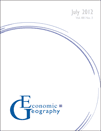
ECONOMIC GEOGRAPHY
Scope & Guideline
Decoding Spatial Dynamics in Economic Development
Introduction
Aims and Scopes
- Spatial Dynamics of Economic Processes:
Investigates how economic activities are distributed across space, examining the factors that influence regional development, urbanization, and economic disparities. - Global Production Networks:
Explores the interconnections among firms, industries, and regions within global value chains, analyzing how these networks affect local economies and labor markets. - Innovation and Knowledge Economy:
Focuses on the role of innovation in economic development, particularly how knowledge is generated, shared, and utilized across different spatial contexts. - Socioeconomic Inequalities:
Examines the spatial dimensions of socioeconomic inequalities, including income disparities, labor market dynamics, and access to resources within and between regions. - Cultural and Political Economy:
Analyzes the influence of cultural and political factors on economic behavior and decision-making, highlighting the interplay between local contexts and global trends.
Trending and Emerging
- Digital Economy and Technological Change:
Papers focusing on the implications of digital technologies for economic structures and labor markets are increasingly prevalent, highlighting the critical role of technology in shaping contemporary economies. - Sustainability and Environmental Economics:
There is a growing emphasis on sustainability, with research exploring the intersection of economic activities and environmental concerns, driven by the urgency of climate change and resource management. - Social Justice and Labor Relations:
Themes related to social equity, labor rights, and the experiences of marginalized groups in economic systems are gaining traction, reflecting broader societal movements and calls for inclusivity. - Globalization and Geopolitical Dynamics:
The impact of geopolitical shifts on economic networks and production processes is increasingly examined, particularly in the context of recent global tensions and economic decoupling. - Urbanization and Regional Resilience:
Emerging studies are focusing on urban resilience in the face of economic shocks, exploring how cities adapt and transform in response to crises such as the COVID-19 pandemic.
Declining or Waning
- Traditional Economic Theories:
There has been a noticeable shift away from classical economic theories that do not account for spatial dimensions. This decline may reflect the growing recognition of the importance of place and context in economic analysis. - Static Regional Comparisons:
Research that relies heavily on static comparisons of regions without considering dynamic changes over time has become less prominent, as scholars increasingly focus on processes and transformations. - Sector-specific Analyses:
Studies that concentrate solely on individual sectors without exploring their interconnectedness within broader economic systems have decreased, as the trend moves towards integrated approaches. - Environmental Determinism:
Discussions centered around environmental determinism, which posits that physical geography dictates economic outcomes, are less frequent, giving way to more nuanced understandings of human agency and socio-political factors. - Overemphasis on Quantitative Metrics:
There is a declining focus on purely quantitative analyses without qualitative insights, as researchers recognize the value of mixed-method approaches to understand complex economic phenomena.
Similar Journals

Equilibrium-Quarterly Journal of Economics and Economic Policy
Catalyzing Collaboration in Economic Research and PolicyEquilibrium-Quarterly Journal of Economics and Economic Policy is a leading open-access journal, published by the Institute of Economic Research in Poland. Since its inception in 2011, this journal has served as a vital platform for disseminating innovative research and scholarly discourse in Economics and Economic Policy. The journal maintains a high impact within the academic community, currently holding a Q2 ranking in Economics and Econometrics and a Q1 ranking in the miscellaneous category of Economics, Econometrics, and Finance as of 2023. With an impressive Scopus ranking, it sits at #8 out of 242 in its field, demonstrating its commitment to quality and relevance in contemporary economic research. The journal welcomes contributions that advance theoretical and empirical discussions, encompassing a broad spectrum of topics in economics, thereby appealing to researchers, professionals, and students alike. Through its open access model, Equilibrium ensures widespread availability of knowledge and fosters collaboration across disciplines within the global economic community.

Journal of Economics
Elevating insights in economics and econometrics since 1930.The Journal of Economics, published by SPRINGER WIEN, serves as a prominent platform for the dissemination of high-quality research in the fields of economics and econometrics, contributing significantly to the academic community since its inception. With its ISSN 0931-8658 and E-ISSN 1617-7134, this journal encompasses a wide range of topics and maintains a robust publication timeline from 1930 to 2024. Recognized for its relevance, the journal currently holds a Q2 ranking in Business, Management and Accounting and a Q3 ranking in Economics and Econometrics, highlighting its vital role in shaping contemporary economic discourse. Researchers will find valuable insights drawn from both historical and contemporary studies, making it an essential resource for professionals, academicians, and students alike. Although the journal is not open access, its commitment to rigorous peer review ensures that published research meets high academic standards, thereby fostering informed decision-making in economic policy and practice.
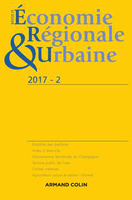
Revue d Economie Regionale et Urbaine
Exploring the dynamics of urban development and policy.Revue d Economie Regionale et Urbaine is a prestigious journal published by ARMAND COLIN, dedicated to advancing the field of regional and urban economics. Renowned for its rigorous peer-reviewed articles, this journal provides a vital platform for scholars, practitioners, and students to explore contemporary issues, methodologies, and case studies in regional development, urban policy, and economic geography. With its ISSN 0180-7307 and E-ISSN 2107-0865, the journal facilitates widespread dissemination of knowledge, although it currently does not offer open access options. Situated in Paris, France, Revue d Economie Regionale et Urbaine plays a critical role in fostering dialogue and innovation among academics and policymakers alike, contributing significantly to the understanding and enhancement of urban and regional economies.

TIJDSCHRIFT VOOR ECONOMISCHE EN SOCIALE GEOGRAFIE
Bridging Economics and Geography for a Better TomorrowTIJDSCHRIFT VOOR ECONOMISCHE EN SOCIALE GEOGRAFIE, an esteemed journal published by WILEY, provides a premier platform for the dissemination of cutting-edge research within the fields of economics and social geography. With an ISSN of 0040-747X and an E-ISSN of 1467-9663, this journal has established itself as a pivotal resource, exhibiting a remarkable Q1 ranking in both Economics and Econometrics as well as Geography, Planning and Development for 2023. Notably, it is positioned in the 95th percentile among 821 journals in its category of Social Sciences, and ranks 46th among 716 in Economics and Econometrics, underscoring its influential role in shaping academic discourse. The journal, which has been in publication since 1967 and is anticipated to run through 2024, invites contributions that explore the intricate interplay between economic phenomena and social geospatial dynamics. Researchers, professionals, and students are encouraged to engage with its findings, which are crucial for understanding contemporary socio-economic challenges and innovations on a global scale.

Prace Komisji Geografii Przemyslu Polskiego Towarzystwa Geograficznego-Studies of the Industrial Geography Commission of the Polish Geographical Society
Navigating the Future of Spatial ManagementPrace Komisji Geografii Przemyslu Polskiego Towarzystwa Geograficznego, also known as Studies of the Industrial Geography Commission of the Polish Geographical Society, is a pivotal open-access journal published by the Pedagogical University of Cracow, specifically by the Institute of Geography's Department of Entrepreneurship and Spatial Management. Since its inception in 2009, this journal has been dedicated to advancing the field of industrial geography, providing a platform for researchers and scholars to publish their findings and share insights related to spatial management and economic geography. With an ISSN of 2080-1653 and an E-ISSN of 2449-903X, the journal is indexed in various academic databases, helping to ensure that its contributions reach a wide audience. The importance of the journal lies in its role in fostering interdisciplinary discussions that address contemporary challenges in industrial geography, making it an indispensable resource for professionals, students, and researchers committed to understanding the complexities of spatial dynamics in industrial contexts.
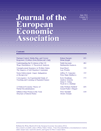
Journal of the European Economic Association
Navigating Complex Economic Challenges with Scholarly RigorThe Journal of the European Economic Association, published by Oxford University Press, stands as a cornerstone in the field of economics, boasting a strong impact factor that reflects its high citation rates and significance among peers. With an impressive Scopus ranking of 12 out of 288 in general economics, encompassing a remarkable 96th percentile, this journal is recognized for its rigorous peer-reviewed research contributions that advance the understanding of economic theory and policy. Dedicated to publishing innovative studies and theoretical advancements since its inception in 2003, it continues to engage scholars worldwide, providing vital insights applicable to both academia and industry. Although it does not follow an open-access model, the journal's extensive reach and commitment to excellence make it an essential resource for researchers, professionals, and students seeking to deepen their understanding of contemporary economic issues. Based in the United States, the journal reflects a European perspective on global economic challenges, making it indispensable for those at the forefront of economic research.
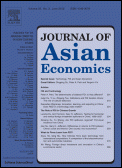
Journal of Asian Economics
Empowering Scholars and Practitioners in Asian EconomicsThe Journal of Asian Economics, published by Elsevier, serves as a pivotal platform for scholars and practitioners engaged in the comprehensive study of economic issues within Asia. With an ISSN of 1049-0078 and an E-ISSN of 1873-7927, this esteemed journal encompasses a wide array of topics in its scope, ranging from macroeconomic policy analysis to the intricacies of financial markets in the Asian context. Ranking in the Q2 category for both Economics and Econometrics and Finance, according to the 2023 metrics, it is positioned among the top-tier journals, currently holding a significant place at the 73rd percentile in Finance and 72nd percentile in Economics. This journal not only caters to academic researchers looking to publish their findings but also serves as an essential resource for professionals and students seeking to deepen their understanding of the dynamic economic landscape in Asia. By bridging empirical research and practical insights, the Journal of Asian Economics plays a crucial role in advancing knowledge and encouraging discourse in the field.
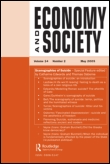
ECONOMY AND SOCIETY
Connecting Economic Theory with Social PracticeECONOMY AND SOCIETY, published by Routledge Journals, Taylor & Francis Ltd, is a premier academic journal that bridges the realms of economics and social sciences, making significant contributions to interdisciplinary scholarship. Established in 1972 and ongoing through 2024, this journal holds an esteemed Q1 ranking in multiple categories, including Business and International Management, Economics and Econometrics, and History, underscoring its impact within academia. With Scopus rankings placing it in the top percentiles across various fields, ECONOMY AND SOCIETY serves as an essential platform for researchers, professionals, and students to explore critical topics such as economic behavior, societal structures, and historical contexts. Although it does not offer Open Access, its rigorous peer-reviewed articles are instrumental in influencing policy and fostering scholarly dialogue. Explore the full range of issues and contribute to this vibrant academic community focused on the intersection of economy and society.

Environment and Planning A-Economy and Space
Bridging Economic Dynamics with Environmental ContextsEnvironment and Planning A-Economy and Space is a leading academic journal published by SAGE Publications Inc, dedicated to advancing the interdisciplinary study of economic and spatial dynamics within environmental contexts. With its strong focus on areas such as environmental science and geography, the journal holds an impressive ranking in the top quartile (Q1) for both fields, reflecting its commitment to high-quality, impactful research. The journal publishes original articles, theoretical insights, and empirical studies that explore the complex interrelations between economy, space, and the environment, catering to academics, practitioners, and policymakers alike. Environment and Planning A is not only pivotal for the dissemination of research findings but also serves as a vital platform for scholarly dialogue, making it indispensable for researchers and professionals aiming to contribute to sustainable development and spatial planning. Please note that while this journal is not currently Open Access, it provides a comprehensive collection of articles from 1973 to 2024, ensuring a rich historical context for contemporary environmental studies.
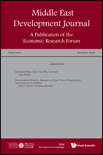
Middle East Development Journal
Innovating Perspectives on Regional Growth and PolicyMiddle East Development Journal is a premier academic publication dedicated to advancing scholarly discourse in the fields of Development, Economics, and Political Science, and is published by Routledge Journals, Taylor & Francis Ltd. With an ISSN of 1793-8120 and an E-ISSN of 1793-8171, this journal serves as a vital platform for researchers, professionals, and students eager to explore pivotal issues shaping the socio-economic landscapes of the Middle East. Operating within the Q3 category across multiple relevant disciplines, the journal is committed to fostering interdisciplinary perspectives and critical insights while maintaining a rigorous peer-review process. As it converges major themes from 2012 to 2024, the journal not only enhances the academic narrative but also informs policymaking and development strategies in a region marked by both challenges and opportunities. Researchers interested in contributing to or learning from the latest findings in these fields are encouraged to engage with the journal's diverse array of articles, which reflect the dynamic and evolving nature of Middle Eastern socio-economic studies.